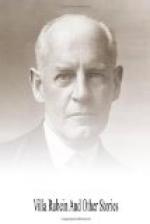“You smoke, Mr. Harz?”
Harz took the proffered weed, and lighted it from the glowing tip of Mr. Treffry’s cigar, by light of which his head and hat looked like some giant mushroom. Suddenly the wheels jolted on a rubble of loose stones; the carriage was swung sideways. The scared horses, straining asunder, leaped forward, and sped downwards, in the darkness.
Past rocks, trees, dwellings, past a lighted house that gleamed and vanished. With a clink and clatter, a flirt of dust and pebbles, and the side lamps throwing out a frisky orange blink, the carriage dashed down, sinking and rising like a boat crossing billows. The world seemed to rock and sway; to dance up, and be flung flat again. Only the stars stood still.
Mr. Treffry, putting on the brake, muttered apologetically: “A little out o’hand!”
Suddenly with a headlong dive, the carriage swayed as if it would fly in pieces, slithered along, and with a jerk steadied itself. Harz lifted his voice in a shout of pure excitement. Mr. Treffry let out a short shaky howl, and from behind there rose a wail. But the hill was over and the startled horses were cantering with a free, smooth motion. Mr. Treffry and Harz looked at each other.
XVII
Mr. Treffry said with a sort of laugh: “Near go, eh? You drive? No? That’s a pity! Broken most of my bones at the game—nothing like it!” Each felt a kind of admiration for the other that he had not felt before. Presently Mr. Treffry began: “Look here, Mr. Harz, my niece is a slip of a thing, with all a young girl’s notions! What have you got to give her, eh? Yourself? That’s surely not enough; mind this—six months after marriage we all turn out much the same—a selfish lot! Not to mention this anarchist affair!
“You’re not of her blood, nor of her way of life, nor anything—it’s taking chances—and—” his hand came down on the young man’s knee, “I’m fond of her, you see.”
“If you were in my place,” said Harz, “would you give her up?”
Mr. Treffry groaned. “Lord knows!”
“Men have made themselves before now. For those who don’t believe in failure, there’s no such thing. Suppose she does suffer a little? Will it do her any harm? Fair weather love is no good.”
Mr. Treffry sighed.
“Brave words, sir! You’ll pardon me if I’m too old to understand ’em when they’re used about my niece.”
He pulled the horses up, and peered into the darkness. “We’re going through this bit quietly; if they lose track of us here so much the better. Dominique! put out the lamps. Soho, my beauties!” The horses paced forward at a walk the muffled beat of their hoofs in the dust hardly broke the hush. Mr. Treffry pointed to the left: “It’ll be another thirty-five miles to the frontier.”
They passed the whitewashed houses, and village church with its sentinel cypress-trees. A frog was croaking in a runlet; there was a faint spicy scent of lemons. But nothing stirred.




